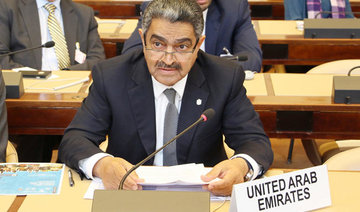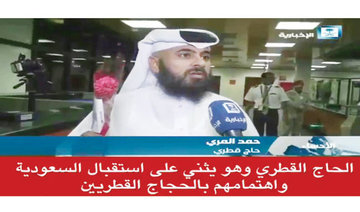JEDDAH: Anti-Terror Quartet (ATQ) diplomats on Tuesday lashed back at Doha’s latest “provocations” after Qatar’s state minister for foreign affairs praised Iran and blamed the bloc for a humanitarian crisis caused by their blockade of Qatar.
During a meeting of ministers at the Arab League, Sultan Saad Al-Muraikhi, Qatar’s permanent envoy to the Arab League, also challenged the quartet to present evidence that his country was supporting extremist groups and terrorists.
“We are advocates of peace and speak openly. We don’t work like bats at night and our decisions are issued in broad daylight,” he said. He also referred to Iran as an “honorable state” for not obliging Doha to open an embassy on its soil.
The quartet of Saudi Arabia, Bahrain, Egypt and the United Arab Emirates severed diplomatic relations and cut trade ties with Qatar in June, listing 13 demands including a stop to its support for terrorist groups. Qatar has denied the charges.
A heated exchange occurred when Muraikhi accused the quartet of looking to depose the Emir of Qatar and replace him with Sheikh Abdullah bin Ali Al-Thani, who helped negotiate the entry of Qatari pilgrims attending the annual Hajj pilgrimage into Saudi Arabia.
Saudi Arabia's permanent envoy to the Arab League, Ahmed Kattan, protested. “This is an improper thing to say because the kingdom of Saudi Arabia will never resort to such cheap methods and we don’t want to change the regime, but you must also know that the kingdom can do anything it wants, God willing,” he said.
Kattan added that Qatar “killed any hope” of ending the Gulf crisis. ”The four countries will continue sticking to their demands until Doha comes to its senses,” he said.
Egyptian Foreign Minister Sameh Shoukri criticized the Qatari envoy’s remarks as being full of “provocations and inappropriate speech that shouldn’t be used in such corridors,” and “especially in an unacceptable manner.”
He reiterated the ATQ’s charges that Doha had been "supporting terrorism” and that Egypt has the right to protect its interests and take all measures guaranteed by international law.
“We all know Qatar’s historic support for terrorism and what has been provided for extremist factions, and money in Syria, Yemen, Libya and Egypt that have lead to the death of many of Egypt’s sons,” Shoukry said.
Anwar Gargash, UAE state minister for foreign affairs, said that Qatar harbors tens of terrorists listed on many international terror lists.
“The situation has improved in many Arab countries ever since the four countries — Saudi Arabia, the UAE, Bahrain and Egypt, also known as Anti-Terror Quartet (ATQ) — took action against Qatar,” added Gargash. “The four countries adopted those measures to protect themselves from Qatar’s activities targeting their national security.”
Gargash said any dialogue with Qatar should be based on the list of 13 demands. He said Doha itself had informed Kuwait then that it was willing to discuss the six principles and 13 demands set by the ATQ. Kuwait had been trying to mediate between its feuding allies.
Gargash also took issue with Turkey and Iran’s support to Qatar during the crisis, saying that “Qatar’s escape to Turkey and Iran is not solving the crisis.”
Bahrain’s undersecretary of the Ministry of Foreign Affairs for Regional and GCC Affairs, Waheed Mubarak Sayyar, said Qatar has interfered in his country’s internal affairs on multiple occasions and “supported the overthrow of the regime in Bahrain.”
Sayyar added that “Qatar forgot all its actions threatening our stability and focused on humanitarian aspects.
Damning connections
A review of nearly 50 US Treasury Department-designated senior Al-Qaeda financial facilitators revealed damning connections between the Tehran Al-Qaeda network and Qatar-linked terror operatives.
At the center of the Qatar-Al-Qaeda-Iran trifecta is Qatari national Salim Khalifa Al-Kuwari. He was designated by the US as a senior Al-Qaeda facilitator and financier who to this day lives and operates in Doha. Al-Kuwari, according to US intelligence, has provided hundreds of thousands of dollars in financial support to the Al-Qaeda cell in Iran headed by Muhsin Al-Fadhli.
Al-Kuwari also reportedly facilitated travel for extremist recruits on behalf of senior Al-Qaeda facilitators based in Iran, and was a central link for Al-Qaeda leaders based in Tehran to funnel money, messages and fighters from South Asia into the Middle East.
Another reportedly crucial Qatari financier of Al-Qaeda’s terror activities is Khalifa Muhammad Turki Al-Subaiy, who also operates in Doha and was a major source of funding to a senior lieutenant to Al-Fadhli.
Al-Subaiy provided millions of dollars for nearly a decade to Al-Qaeda’s Khorasan group in Syria that was established by Al-Fadhli while he was in Iran, according to Western intelligence sources and US Treasury Department designations. Doha actively lobbied Lebanon to release of one Al-Subaiy’s key moneymen Abdul Aziz bin Khalifa Al-Attiyah after he was briefly detained in Lebanon in 2012.
Yet another terror suspect was Tariq Al-Harzi, a senior Daesh facilitator who was singlehandedly responsible for years for recruiting and moving European foreign fighters. According to the US Treasury Department, in 2013 he arranged for Daesh to receive approximately $2 million from a Qatar-based financial facilitator. Reportedly, Al-Harzi played an important role with fundraising efforts in Qatar, and Doha did nothing to curb these activities.
One of the Khorasan group’s most notorious leaders is Mohammed Shawqi Al-Islambouli, a longtime Al-Qaeda operative and brother of the terrorist who assassinated former Egyptian President Anwar Sadat. Al-Islambouli was based for a time in Tehran and is very close to Al-Qaeda leader Ayman Zawahiri, according to reports.
Doha has reportedly hosted Al-Islambouli on numerous occasions for officially sanctioned events. He took to social media recently to praise Qatar, begging the question: Why did one of Al-Qaeda’s most senior operators and a longtime Tehran resident feel obliged to come to Qatar’s defense?
























